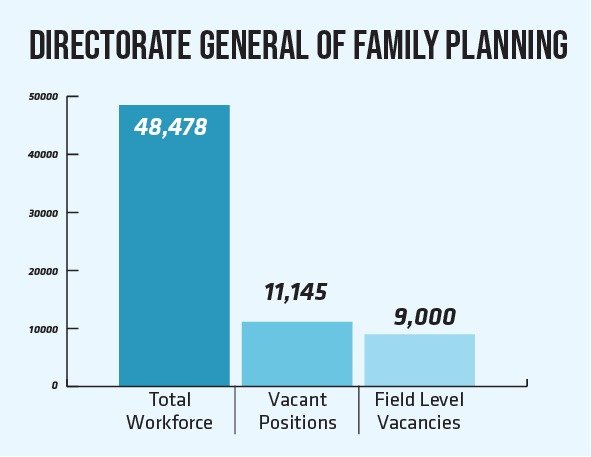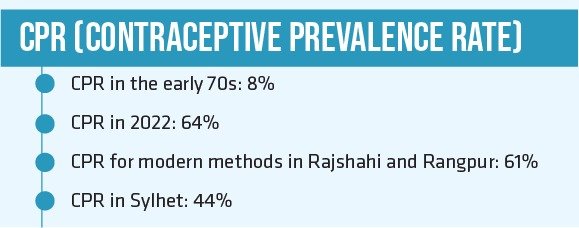Key Highlights:
- Birth control method usage has declined in 2023, standing at 62.1%
- There are currently 11,145 vacant positions across various levels of the Directorate General of Family Planning
- A check on the government’s supply chain management portal shows that there is currently no Implanon available in any of the 494 upazilas in Bangladesh
Family planning plays a crucial role in individual well-being and community health. However, recent data from Bangladesh reveals a concerning trend of diminishing contraceptive supplies, raising concerns about potential impacts on population health and prospects.
Contraceptive utilization in the country has fallen back to the level recorded 8 years ago. Birth control method usage has declined in 2023, standing at 62.1% – the lowest rate since 2015, according to a report by the Bangladesh Bureau of Statistics (BBS).
The BBS report, ‘Important Results of Bangladesh Sample Vital Statistics 2023’, published the latest figures on contraception method use. The report showed a 61% rate of using modern birth control methods and a 1% higher usage of traditional methods. Contraceptive use was lower in rural areas compared to urban areas, with nearly 64% usage in cities and 62% in villages.
You can also read: Why Inflation Taming Approaches Miss Bangladesh’s Market?
Also, the government has yet to replenish the contraceptive stock. As a result, with fewer birth control options available, unintended pregnancies are likely to increase, contributing to population growth, higher abortion rates, health complications for mothers and newborns, and increased medical expenses.
There is a direct correlation between contraceptive use and maternal mortality rates. With more children born in shorter intervals, mothers face higher health risks and may struggle to provide proper care for all their babies, potentially leading to adverse consequences. The ramifications of this contraceptive supply shortage are severe.

Why has Bangladesh’s Family Planning Hit a Roadblock?
There are currently 11,145 vacant positions across various levels of the Directorate General of Family Planning, representing nearly 23% of its total workforce. Of these vacancies, more than 9,000 are at the field level. Concurrently, the government’s inventory of reproductive health products is dwindling, with some districts facing complete shortages of contraceptive and menstrual hygiene products.
This severe scarcity of essential reproductive health supplies, compounded by the absence of field officers who provide crucial door-to-door services, indicates a profound neglect of the government’s reproductive health priorities.
Over the past 19 years, contraceptive usage has only seen a meager 6% increase, rising from 48% to 54%. This sluggish growth, combined with a persistent 12% unmet need for contraception, highlights the failure of authorities to adapt to the changing requirements of the population. In rural areas, these challenges are exacerbated by inadequate transportation, widespread illiteracy, and societal taboos surrounding family planning.

Fertility Stagnation: A Cautionary Tale for Population Control Efforts
Bangladesh’s Total Fertility Rate (TFR) reached 2.3 in 2011, slightly above the government’s target of 2.1. However, it has remained stagnant according to the past 4 Bangladesh Demographic and Health Surveys (BDHS). Family planning methods are crucial to attaining the target TFR, and the contraceptive prevalence rate (CPR) is a key indicator.
The CPR has gradually increased from 8% in the early 70s to 64% in 2022. Birth spacing has also been successful, with an average gap of 5 years between children, but the rate of teenage pregnancy, although reduced to 24%, requires further improvement. In Rajshahi and Rangpur, the CPR for modern methods is 61%. Yet, the rates of early marriage (57%) and early pregnancy (31%) remain high. On the other hand, Sylhet has lower rates of early marriage and early pregnancy, despite a CPR of only 44%. This highlights that addressing early child marriage requires more than just family planning programs.
After the age of 40, 31% of married women use traditional family planning methods, increasing to 36% for the 45-49 age group. Unintended pregnancies in this age group pose risks and can lead to maternal mortality.

Ground Level Realities
Field workers from the family planning directorate distribute free birth control contraceptives to eligible couples, which can also be obtained from government centers. These contraceptives include Implanon, condoms, oral birth control pills, emergency contraceptive pills, injections, and implants.
A check on the government’s supply chain management portal shows that there is currently no Implanon available in any of the 494 upazilas in Bangladesh. Implanon is a long-acting contraception inserted as a soft rod under the skin of a woman. Additionally, there are no supplies of the two-rod implants in 49 upazilas.
While the stock of oral birth control pills has not yet been depleted according to the website, they are unavailable in 38 upazilas. Specifically, the oral pill ‘Apon,’ intended for use only 6 months after childbirth, is not accessible in 67 upazilas.

Awareness about LARC and Permanent Methods
Among the 64% of women utilizing contraceptive methods, the majority favor short-acting and hormone-dependent options. Despite national advocacy for Long-Acting Reversible Contraception (LARC) like implants and Intrauterine devices (IUDs), merely 3% of women select these alternatives. Therefore, there’s a pressing need to increase awareness about LARC and permanent methods.
Promoting the adoption of IUDs or permanent solutions can significantly enhance overall well-being, particularly reproductive health. Traditionally, decisions regarding family planning were predominantly male-driven. However, a notable shift has occurred in the past two decades, with 78% of couples now making decisions jointly. Consequently, the communication strategy of family planning programs should aim to engage both husbands and wives to stimulate greater demand.
Additionally, the media landscape is undergoing rapid transformation. Embracing mobile phones and social media platforms is imperative for the effective dissemination of family planning program information.
Bangladesh’s once-vaunted family planning program is faltering, with contraceptive use plummeting to levels not seen in nearly a decade. Unmet contraceptive needs, stagnant fertility rates, and a dire lack of awareness about long-acting reversible contraception pose formidable obstacles. Unless this crisis is urgently addressed through replenishing stocks, increasing the workforce, and revamping awareness campaigns, Bangladesh risks backsliding on hard-won gains in maternal and child health. The nation’s family planning efforts are at a critical crossroads, demanding decisive action to avert a looming population crisis that could undermine decades of development.


